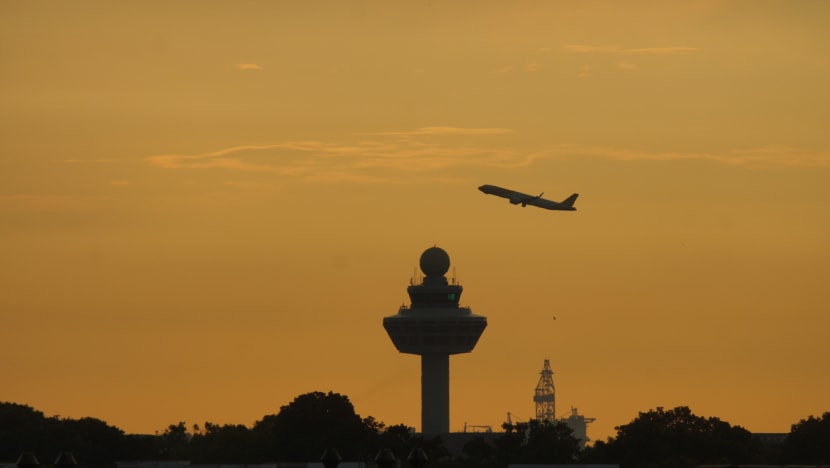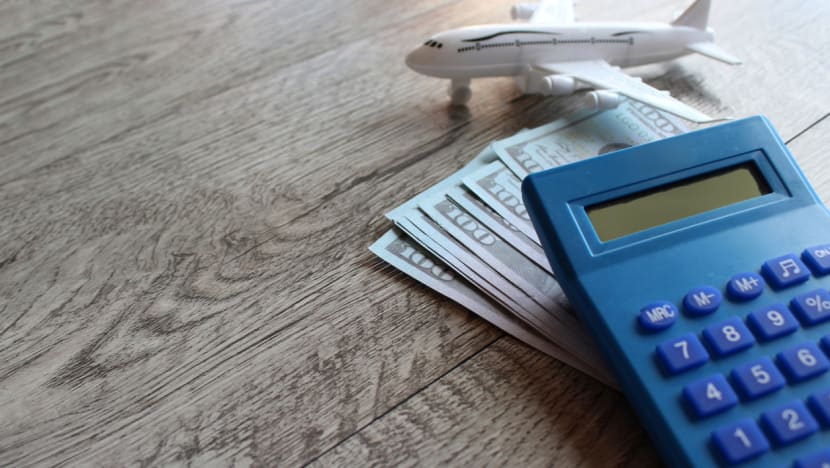CNA Explains: Who pays for the flight and other questions on how foreign convicts are deported from Singapore
Are foreign convicts deported immediately from Singapore after finishing their jail terms?

A plane departs Changi Airport. (Photo: iStock)

This audio is generated by an AI tool.
SINGAPORE: In November, Chinese national Han Feizi was deported after serving a jail term for altercations and arguments with a security guard, a police officer and hospital employees.
Han gained notoriety after TikTok videos of her arguing with the police went viral. Social media users applauded the news of her deportation, but how foreign convicts are expelled from Singapore is a process that remains opaque even to seasoned criminal lawyers.
In its official response to CNA, the Immigration and Checkpoints Authority (ICA) said it was unable to divulge details of deportation procedures due to "operational sensitivities".
However, it said biometrics scanning technology at Singapore's checkpoints can detect deported individuals if they attempt to re-enter Singapore under another identity or passport.
To get some insight into the process, CNA spoke to a foreigner who was sent home after completing a jail term, as well as several lawyers who have had clients deported. Some lawyers declined to be named, citing the sensitivity of the topic.
What happens when a foreigner is deported?
The idea behind deportation is for the foreigner to be "removed" from Singapore and returned to their home country, said lawyer Gloria James-Civetta.
She said her previous clients who were deported after serving their sentence in Singapore were generally escorted from prison to ICA, where they were processed to be deported.
"Depending on their home country, they would either be sent to the airport, to the ferry terminal or customs."
She usually advised her clients to pack and send their belongings back home before beginning their sentence in Singapore.
In its response to CNA, ICA said a foreigner who has been convicted and jailed for an offence in Singapore is deemed to be an "undesirable immigrant" and liable to be "removed" under the Immigration Act.
"The presence of a foreigner may also be undesirable from a public interest perspective, for example, if their presence in Singapore threatens the safety and security of the local community," said the ICA spokesperson.
John's experience
John (not his real name), who is in his 50s, was convicted in Singapore of criminal breach of trust and jailed.
He told CNA that foreign convicts are usually deported immediately upon finishing their jail terms, if they do not have a valid pass to stay in Singapore.
However, he said he was given a "quite rare" extension via a Special Pass to stay in Singapore after finishing his jail term, pending his flight home at his own expense.
When he completed his jail term, John said he was transported from Changi Prison to ICA, which he said seemed to be the general rule.
He was released on a Special Pass, on the condition that he present his air ticket no later than the next day.
"As I got from my talk with the officials of ICA, it is (an) extremely rare case," said John.
"Normally, if a ticket is supposed to be bought by a person released from jail in return (for) a longer stay in Singapore before departure, this ticket has to be presented immediately upon arriving at ICA from the jail."
Even if the air ticket is presented, it is no guarantee that the convict will be allowed to stay longer in Singapore before flying home, said John.
"If the decision is negative, it is very unlikely, near to impossible, to get a permit to visit any place in Singapore before departure, even to collect personal belongings."
Convicts who are deported upon finishing their jail terms are allowed to change into their own clothes in ICA's detention area before departure, said John.
John said he was not escorted to the plane, but added that this decision was made by ICA depending on how dangerous a convict is determined to be, if they are left in Singapore on their own before the scheduled departure.
Being detained under ICA was not much different from conditions in jail, he added.
"But the staff of the detention department of ICA are quite friendly and polite, yet I have (a) strong feeling that it depends on how heavy the sentence was," he said.
"In my case the staff was ready to listen to my requests but I am sure ICA (agrees to) such requests only if the argumentation is strong, well-prepared and documented."
Who pays for the flight?

A lawyer who did not want to be named said ICA usually sends a representative to prison to inform the foreigner about their deportation and ask if they have the means to pay for their own transport home.
Those who pay for their flight may have more control over when they return home, said Ms Joyce Khoo from Quahe Woo & Palmer. However, if they are unable to afford it, the Singapore government will cover the cost.
Such convicts would be taken from Changi Prison to ICA's remand facility, another lawyer said. After ICA secures the cheapest and most direct flight to the prisoner's home country, it escorts the convict to the airport and ensures that they board the flight home.
Lawyer Chung Ting Fai told CNA that foreigners are allowed to contact their friends or relatives either in Singapore or overseas to buy flight tickets for them.
If there are direct flights, they can fly to their hometown. In the case of China, if there are no direct flights, they would typically fly to Guangzhou city, said Mr Chung.
Lawyer Josephus Tan from Invictus Law said Malaysian convicts would usually be deported via the Causeway.
Convicts being deported are usually not allowed to collect their belongings in Singapore on their own and have to ask their friends to help, he said.
He also said foreigners holding passes such as work passes, employment passes or social visit passes would "almost certainly" have their passes revoked.
Some convicts who receive fines rather than jail might not face "immediate" deportation.
"This means after they have paid the fine in court, they can still stay around until they receive official notification from the Ministry of Manpower or ICA," said Mr Tan.
Deportation vs repatriation vs extradition
You may have heard these terms being used, perhaps interchangeably, to describe the transfer of a foreign person – deportation, repatriation and extradition. What is the difference?
Mr Marshall Lim, partner at Martin & Partners and a former deputy public prosecutor, said deportation is generally used to describe the decision and process of expelling a foreigner who is no longer welcome.
Repatriation has a "more neutral connotation" and refers to the return of a foreigner to his or her country of origin.
"Voluntary repatriation generally involves a foreigner who elects, on his own accord, to terminate his stay in the country," said Mr Lim.
Involuntary repatriation happens when the foreigner's permission to remain in the country expires or is revoked – such as when a foreigner's work pass is cancelled.
Mr Sunil Sudheesan, director and head of the criminal department at Quahe Woo & Palmer, said a person can apply to have himself or his family repatriated at the cost of the government if he meets the following four requirements.
He must not be a citizen of Singapore, he must be unable to obtain employment or to support himself by reason of destitution, infirmity or mental incapacity, he must be unable to pay the cost of the passage home, and he is, or is likely to become "a charge upon the public or on a charitable institution".
"An individual who requests to be or is repatriated by the government must enter into an undertaking that they will not return to Singapore without the written sanction of the Controller," said Mr Sudheesan.
He gave an example of how 53 migrant workers involved in the December 2013 riot in Little India were repatriated.
Extradition, which is governed by the Extradition Act, delivers a person accused or convicted of a crime in another jurisdiction to that country's law enforcement, said Ms Khoo.
A formal arrangement known as an extradition treaty signed between Singapore and the other country is usually required, with agreed conditions laid out in the treaty.
.jpeg?itok=_gqRop-U)
Can deported individuals return to Singapore?
Those who have been deported cannot return to Singapore, according to ICA.
"Undesirable foreigners who have been deported will be barred from entering Singapore. They will need to seek consent from the Controller of Immigration for subsequent entry into Singapore," its spokesperson said.
But one lawyer explained that this may differ for those who are repatriated.
He said some are not banned from returning at all, while others are not banned but are required to seek permission before re-entering. Yet others are banned for a fixed number of years, while some are banned indefinitely from entering Singapore.
"If a person has had their work pass revoked due to a crime having been committed and (was) subsequently banned from re-entering Singapore, they can apply to the authorities to have their case reviewed," said Quahe Woo & Palmer's Ms Khoo.
She added that the authorities have the sole discretion to decide whether to grant the person re-entry into Singapore.

















